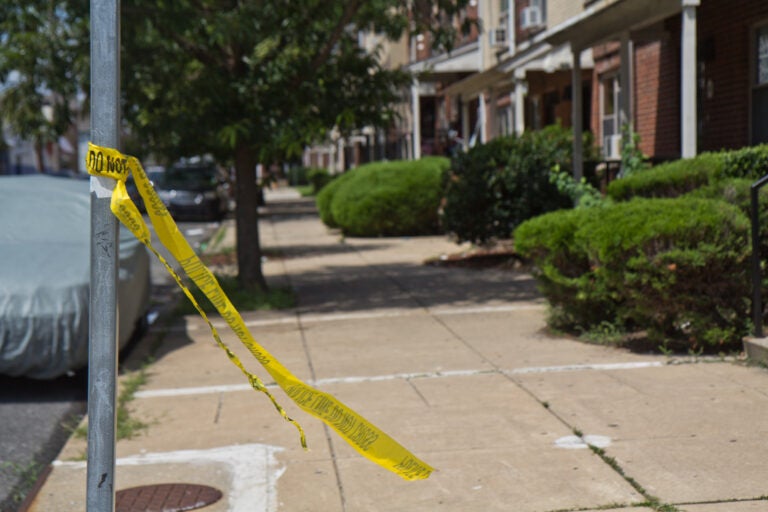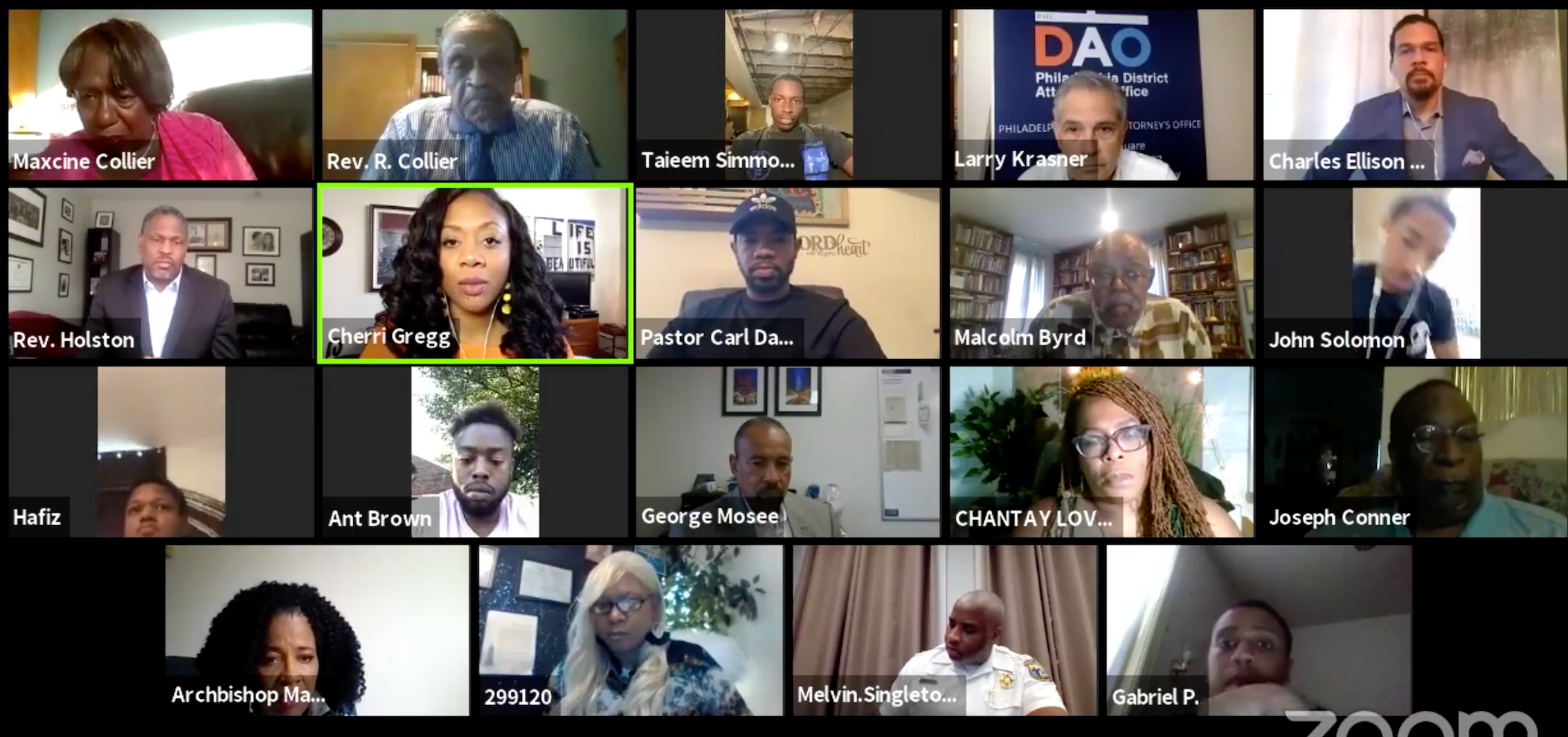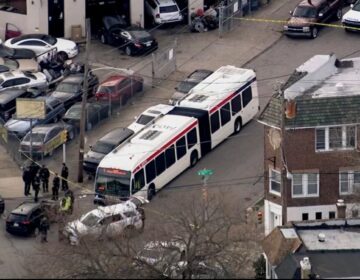To stop shootings, young people say Philly must confront the ‘status and money’ guns can bring
‘Speaking about consequences being a motivator for them to stop gun violence isn’t enough,’ said one participant in a town hall on Philly’s gun violence epidemic.

Remnants of crime scene tape on Brown Street in North Philadelphia where five people were wounded in a shooting at a block party. (Kimberly Paynter/WHYY)
Some young Philadelphians say it’s easy for them to gain access to a gun in the city. Activist John Solomon said he first got his hands on one around the time he was 11.
“To be honest, I could get a gun right now,” he said. “I could get a gun before I could get a decent job opportunity”
Gun availability and a lack of opportunities are not the only factors driving young people to violence, said Solomon. He was one of several young adults who participated in a virtual town hall Monday evening, hosted by the Black Clergy of Philadelphia and Vicinity, the second in a series of events looking at the root causes of and possible solutions to the city’s gun violence epidemic.
Solomon told nonprofit, law enforcement and religious leaders on the Zoom call that he has been on both ends of a firearm. He was 13 when an older man sold him and his cousin a gun. Solomon was shot two years later. At 18, he said he was arrested for shooting someone and would go on to spend five years behind bars.
When he got out of prison, Solomon said he was lucky the people he’d “went to war” with had moved on and dropped their grudge against him.

As a significant spike in shootings continue to traumatize Philadelphia neighborhoods this summer, Solomon, founder of the group Endangered Kind, said city leaders can’t ignore that young people doing the shooting have “been raised in environments and cultures that tend to reward them financially and emotionally for this type of behavior.”
“If we grew up in environments where it was safe and it was loving and there were opportunities and resources and guidance around us, I almost guarantee that I wouldn’t have made those choices that I made as a kid,” said Solomon.
Addressing these issues and offering young people paths to success that don’t involve a gun, explained Solomon, are the only way to curb the violence in the city long term.
Compared to this time last year, the latest police data shows there has been a 40% increase in shooting victims. Of the 1,281 people shot, more than 100 of the victims were under 18.
Last weekend alone, at least five teens were shot late Saturday night into early Sunday morning. One of them, a 16-year-old, died from his injuries.
“Speaking about consequences being a motivator for them to stop gun violence isn’t enough, because we grew up in a culture that embrace going to prison,” said Solomon, who stressed the need for employment and other supports that could help people achieve the “status and money” they can earn when they pick up a gun.
It’s a point some of the other young men made. Having a gun might make it so someone is less likely to get bullied, and selling drugs can help pay for fancy clothes and help grab the attention of girls, they said.
That’s one of the goals behind Group Violence Intervention, a city program launched in Southwest Philadelphia earlier this month, which involves sitting down small groups of people involved in gun violence (identified with the help of police) with law enforcement, social workers and community activists to offer supports that entice them to put the guns down.
Solomon’s message resonated with Philadelphia District Attorney Larry Krasner, who said his office isn’t doing enough to prevent these incidents from happening.
“You have to pay attention to the emotional satisfaction that comes from being involved in a shooting and you have to get behind that and say what on earth could be emotionally satisfying about shooting another person,” said Krasner.
Ant Brown, a local poet, hip-hop artist and activist said the influence of social media and some music that glorifies drug use and violence also can’t be understated.
“When you’re depressed all the time and you’ve been oppressed for so long and you don’t have knowledge, you don’t have education, or financial literacy … drugs is usually what a lot of these young people go to,” said Brown. “They get high and listen to what they consider good music.”
There’s an opportunity to fight that pressure placed by social media and the harmful side of hip-hop culture, said Brown, by bringing positive “influencers” to schools, showing young people they can achieve status in their communities without picking up a gun.
Gabriel Palmer added another way to help young people who may be experiencing bullying or low self esteem, which could make them more vulnerable to negative outside influences, is by adding more counselors in schools.
“You’ll have a school with 500 kids and one counselor,” Palmer said. “In my grades from 1 to 8, I was there the whole time, I only saw the counselor three times. It didn’t have an impact on my life.”
One solution young town hall participants hesitated to pitch was adding more police into the mix, calling them “too rough” and quick to treat innocent people as guilty.
The adults preaching nonviolence and doing outreach in the community weren’t free of criticism either. One young man said they had some work to do among themselves. Hafiz, who didn’t give his last name, said these groups often work in a disjointed fashion that only allows them to help small groups of people.
“More community leaders need to come together instead of making it a competition to see who do better at what they do,” he said.
 WHYY is among more than 20 news organizations producing Broke in Philly, a collaborative reporting project on solutions to poverty and the city’s push towards economic justice. Follow us at @BrokeInPhilly
WHYY is among more than 20 news organizations producing Broke in Philly, a collaborative reporting project on solutions to poverty and the city’s push towards economic justice. Follow us at @BrokeInPhilly
WHYY is your source for fact-based, in-depth journalism and information. As a nonprofit organization, we rely on financial support from readers like you. Please give today.






